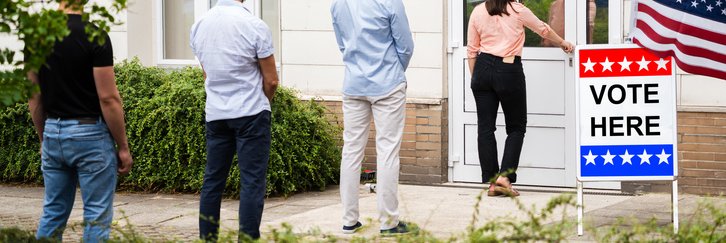How Elections Affect Crypto Markets
KEY POINTS
- Crypto tends to boom after elections -- a $1,000 bet on Bitcoin after the 2016 election turned into $10,000 a year later.
- Presidents don't control crypto prices directly, but their picks for agency heads can make buying Bitcoin easier or harder.
- The crypto market has exploded from nothing to more than $2 trillion, but after FTX's crash, picking a legit exchange matters more than ever.
In 2016, a Bitcoin investor who bought $1,000 worth of Bitcoin on election day would have seen their investment grow to over $10,000 just a year later. It's a dramatic example of how the crypto universe dovetails with elections, and a hint at what's to come during this election season.
How will the next president affect crypto prices? Things are far from certain, and squinting at chart-based tea leaves is a risky way to predict the market.
Even so, some factors remain predictable. One is how people typically react to presidential candidates winning the White House. Another is the long-term trajectories of Bitcoin and Ethereum. What does history have to say about Bitcoin and Ethereum prices post-election?
Bitcoin and Ethereum typically go up
The market caps of major cryptocurrencies typically go up after elections. In the months following 2016 and 2020 elections, prices of Bitcoin and Ethereum rose dramatically, marking major bull runs. Historically, these have begun fast and lasted about a year or so.
2016 to 2017 was a big year
An investor who bought $1,000 worth of Ethereum on election day in 2016 would have seen their investment grow to over $25,000 just one year later.
| Time Period | Bitcoin Price ($) | Ethereum Price ($) |
|---|---|---|
| Election day (2016) | 703 | 11 |
| 2 months later | 908 | 10 |
| 6 months later | 1,172 | 42 |
| 1 year later | 7,141 | 294 |
2020 to 2021 was big, but less so
An investor who bought $1,000 worth of Ethereum on election day in 2020 would have seen their investment grow to over $10,000 just one year later.
| Time Period | Bitcoin Price ($) | Ethereum Price ($) |
|---|---|---|
| Election day (2020) | 13,550 | 383 |
| 2 months later | 32,129 | 774 |
| 6 months later | 59,397 | 2,135 |
| 1 year later | 63,254 | 4,588 |
However, where you buy your cryptocurrency matters. Exchanges have been hacked, and many have gone bankrupt. The last thing you want is a scammer to steal your money.
Trust is in low supply and high demand. Thankfully, many established financial institutions now offer crypto services.
Compare trusted exchanges to protect your investment from unexpected losses. Crypto prices are uncertain, but your wallet's safety doesn't have to be.
Elections reduce uncertainty
Presidents taking the White House tend to reduce uncertainty. That's one explanation for why major crypto markets tend to rise after elections. It's reassuring to feel as if you know how the president will regulate crypto, even if the president seems to dislike it.
However, crypto markets are volatile regardless of who the president is. Bitcoin fell by about 65% from Jan. 6 to Feb. 6, 2018. By Sept. 2018, cryptocurrencies had collapsed 80% from their January peak. This sort of crash is very common in the crypto market.
Presidents have limited control over crypto markets
Presidents have limited direct authority over crypto markets. Most regulation is handled by the Securities and Exchange Commission (SEC), the Commodity Futures Trading Commission (CFTC), and the Treasury Department.
The president does have indirect influence over crypto markets, however.
Elected presidents can issue executive orders to direct federal agencies to study and develop policies related to cryptocurrencies. President Joe Biden did this when he signed an executive order in March 2022 calling for a comprehensive review of digital assets, a.k.a. cryptocurrencies.
Presidents can also nominate the heads of key regulatory agencies like the SEC and CFTC, influencing how regulators approach cryptocurrencies. An agency head who dislikes Bitcoin may make it difficult for brokers to offer it to investors, for example.
Crypto markets have grown regardless of the presidency
Presidents and political parties seem to have had limited impact on crypto prices. Events that have impacted crypto prices are typically related to uncertainty. For example, major exchange FTX declaring bankruptcy shocked the market, and prices dipped.
Since inception, Bitcoin and Ethereum have led the broader growth of the crypto market. Many, if not most, specific currencies have failed to gain major traction. But overall, the market cap of crypto has risen from $0 in 2008 to $2.31 trillion, as of this writing.
Given the cautionary tale of FTX's collapse, choosing a reputable exchange is crucial. Our comparison of top-rated crypto platforms can reveal secure places to put your money. Whether prices rise or fall after this election, using a trusted exchange helps ensure you're prepared for whatever the market brings.
Our Research Expert




